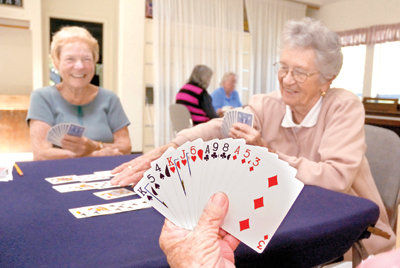
Some of California’s most vulnerable seniors are on the front lines of the recession — in danger of losing services and safety nets, including those that keep them out of high-cost assisted-living facilities.
The 2010-11 California budget proposal released in January by Gov. Arnold Schwarzenegger outlines cuts in the community-based services available to low-income seniors and low-income people with disabilities.
The proposed changes would reduce support for home care in California, setting the state back 30 years, according to a report by the University of California, Los Angeles, Center for Health Policy Research.
“The overall picture is that California is basically in the process of dismantling the safety net for our most frail seniors. But helping seniors remain as independent as possible is not only the right thing to do, it is also the most cost-effective,” said Patty Talbott, associate director of the Seniors Council and Area Agency on Aging of San Benito and Santa Cruz Counties, which operates many programs for older residents and provides research and public hearings about senior issues.
The council also receives federal, state and local funds for senior services and distributes them to other providers.
“With the arrival of the baby boomers, we should be planning for expansion of these programs, not dismantling them,” Talbott said.
The UCLA report took data from nine California counties and found that almost 87 percent of senior citizens with cognitive impairments, such as Alzheimer’s disease, would lose all paid caregiver hours under the proposed cuts. Ninety-one percent of seniors who can’t get groceries without help would also lose all their services.
Similarly, 94 percent of those who live alone would lose all their caregiver hours, as would about 90 percent of those 80 years old and older.
The California Legislature is debating Schwarzenegger’s proposal to cut more than $950 million from the state’s In-Home Supportive Services — a spending reduction that would eliminate help for 87 percent of recipients.
Also on the chopping block are Adult Day Health Care, which provides 37,000 older adults with supervised care outside the home; Medi-Cal, which covers health insurance
for 6.9 million low-income seniors; and Supplemental Security Income, which gives cash assistance to 1.25 million low-income Californians who are aged or have a disability.
Some programs have already had their budgets reduced, but the proposed changes could further cripple them.
“There’s cuts that have happened, and there’s the cuts on the horizon,” Talbott explained.
Brenda Moss, executive director of Santa Cruz-based Senior Network Services, said her group lost all state money for its Linkages Care Management in September 2009.
Linkages arranged basic services — transportation, meals, help with doctor’s appointments — for older people and people with disabilities so they could continue living at home.
“It was a very cost-effective way to help people stay in their homes, where they are much happier. It was devastating that it had to come to a screeching halt,” Moss said.
About 88 people a year were helped, Moss said.
“Some cases we had to close, and others we were able to move around to other programs,” she said. “But four people had to move into a nursing home, which costs the state a lot more money. These cuts are a quick fix that will create long-term problems.”
Moss said programs like Linkages are easy to take away, but difficult to revive.
“It’s unfortunate, because it’s taken so long to make these programs,” Moss said. “I asked myself, why is this happening? Seniors don’t generally have a loud voice on these issues, and they are losing so much right now.”
Kathleen Johnson, executive director of Scotts Valley-based Advocacy Inc., said that while Schwarzenegger’s proposals eliminate help to keep seniors out of assisted-living facilities, they also take money from groups that advocate for and protect seniors who have moved into those facilities.
“The preconceived notion is that all needs are met once a senior is in a facility, but the reality is that they are not,” Johnson said. “The senior in the facility is less visible to the community and thereby more vulnerable.”
Schwarzenegger and the Legislature eliminated money for local ombudsman programs all over the state in the 2008-09 fiscal year. The ombudsman program, which provides protection for seniors living in long-term care facilities, now operates on a shoestring budget using federal cash, Johnson said.
“Once seniors are in a facility setting, it’s the ombudsman that provides support. It’s the only program that assists quality of care and quality of life. But the cuts severely affect the program’s ability to respond and prevent any kind of abuse,” Johnson said.
Rita Eiriksson, 75, of Scotts Valley said that senior programs should be last on the list of cutting options.
“We’ve worked our whole lives for these programs, and now when need them, they’re getting cut. We pay taxes, and we deserve our services,” Eiriksson said over a game of bingo at the Scotts Valley Senior Center.
Carol Beck, a 74-year-old from Scotts Valley, was in disbelief over the governor’s proposed cuts.
“Seniors, most of them, have spent their lives paying into the system. The cuts shouldn’t be aimed at us — it’s not right,” Beck said. “The government says pay this and we’ll help you, and then they don’t help.”
At a glance
• For info: www.advocacy-inc.org or www.seniornetworkservices.org












